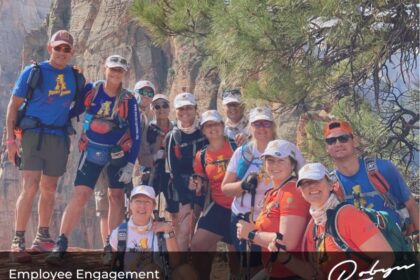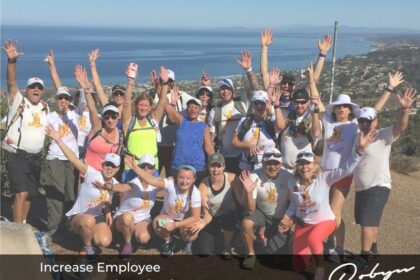Great leaders and teammates have a keen insight into what makes each of their teammates tick or come alive. They know what their teammates are inspired by, what they pride themselves on and what they need in order to be motivated to develop to their full potential.
Not everyone is inspired by a bigger paycheck. Some people are more inspired by recognition, specific rewards, a heartfelt thank-you from the powers that be, the opportunity for advancement and career growth, or a move into a job that uniquely matches their talents.
So what is the key to inspiring your employees to feel excited about shining bright and giving their absolute best performance at work?
How to Unlock the Full Potential of Your Team
1. Discover and Fulfill Your Team Members Core Needs
If we discover our teammates’ core needs, we have the key to inspiring them by finding a way to help them fulfill those needs and give them an opportunity to develop to their full potential.
For example, as the CEO of The Project Athena Foundation, I study every one of the people I bring on board to find the best fit for them within the organization based on who they are at their core instead of hiring them for a specific job description. The person is hired first; the job they eventually do longer term is based on their natural tendencies, passion, engagement, and interests.
The caring connectors end up working with our Survivors to coach them and facilitate their success. The entrepreneurial thinkers and natural spokespeople become our PR and marketing outreach specialists, and the process-oriented work as race and event planners.
I also make sure that their “bonuses” are customized based on their specific needs and life goals. For some, it’s a cash bonus or an opportunity for career advancement, for another, a free trip to hike across the Grand Canyon with our Survivors, and for another, a training package and entry fee to a triathlon or a professional development course.
Obviously, this is much simpler in a small company, but even in a larger one, you can create special awards and ways to recognize each employee based on their unique skill and talent that will make them feel that you “see” them and value their individual contributions.
In other words, employee recognition = employee motivation. When people feel that they are “special” to the people they respect and love, there is no stopping them on their mission!
2. Let people lead based on their talents, never just titles or tenure
Everyone has or knows something valuable that they can contribute to the team, whether it’s life experience, education, specific knowledge, a unique skill or talent, a keen sense of the market, or a magic way with people. The best teams discover and mine those talents for the good of the team without being hamstrung by rank, seniority, tenure, or titles. If you instill in your workplace culture that even the newest people on your team are recognized and valued for their strengths, and are given a platform to share those strengths with the team, you will have a truly inspired employee.
If you’re the type of leader who gives a person a say in their own goals, gives them the grace to rise as high as they choose, values and applauds their unique competencies and strengths, and helps them fulfill core needs, you will have an inspired teammate for life.
3. Focus on Coaching Versus Criticism
If you are mentally pointing a finger at someone when you discuss things that need to be changed (you need more training, you blew that sale, you were unprepared, and so on), your teammate is going to instantly put up a wall and get defensive.
But if you mentally extend a hand instead (here’s what I’m seeing, share your challenges with me, how can I help? what do you need from us to be successful?), then there is a much greater chance that your message will be received in good faith and that positive change will be made. It’s easy to criticize. It’s much harder and much more worthwhile to coach instead, to offer a towline that lets your teammates know you believe in them.
Consciously think about extending a hand to your teammates when behaviors need to change instead of pointing a finger. You will be closer to your goal and be a more well-respected leader at the same time.
4. Understand That We Work For People, Not For Companies
We all start out just working for a company, but somewhere along the line we end up working for the people around us, for our leaders, our teammates. The people around you are your reason for getting up in the morning, the means to feeling good about yourself, they’re the folks you want to inspire, laugh with, kibitz with, and be inspired by. We’ve all had the experience of staying with a particular company way too long because we were so tied in with a fantastic leader or a great team.
Conversely, people flee from great companies with huge opportunities for advancement and look for a different career path because they’d rather chew their own arm off than spend one more day with the circus that is their leadership or their team.
Building a high-performance organization and a highly valued workplace culture starts with who you are every day for your team. One of the greatest leadership skills is knowing how to set the vibe, set the stage for how people are treated, and ensure that the people around you are valued, trusted and inspired. Every day you have to go into work being the person that your teammates hope you are, that they want you to be, that they trust to make good decisions and that they are motivated by. At the end of the day, they will work for you and for each other, not just for the company. The wise team leader always remembers that.
5. Believe Beyond Reason
What happens to people when we believe in them beyond reason? They will often rise to the occasion to prove us right.
The opposite is true as well. If we treat people as though they are not worthy of our respect, they will often find a way to prove us right.
My teammates in Ecuador believed in me far beyond reason when it came time to climb the ice-covered, 19,700-foot Cotopaxi volcano (I was the newest and most inexperienced person on the team), but that belief in me is what gave me the power, physically and mentally, to get to the top. With every step I thought, “I can’t let my teammates down”, and I pictured my team captain Robert’s hopeful face looking down into mine, trying to give me the confidence I needed to stop crying, stand up and get to the top of the mountain.
Give it a try with the teammates in your life: your friends, employees, colleagues and family. Show them that you believe in them and that you trust them, and watch them do everything in their power to prove you right!








